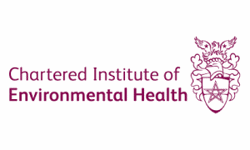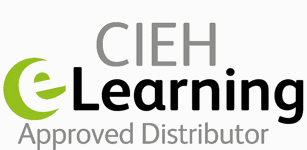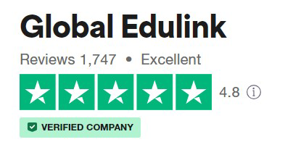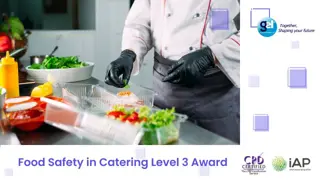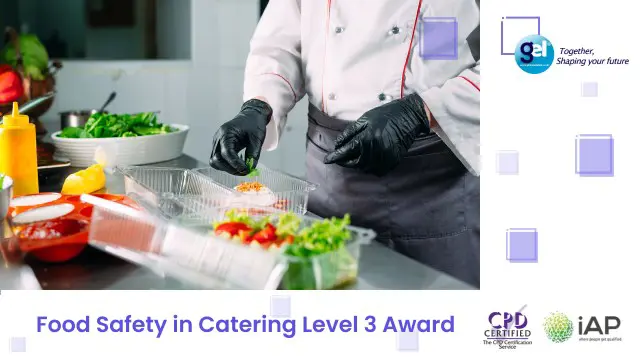
Food Safety in Catering Level 3 Award
Awarded by CIEH | Globally Recognised Qualification | Certificate Included | 365 Days Unlimited Access | Career Support
Global Edulink
Summary
- Tutor is available to students
- TOTUM card available but not included in price What's this?
Add to basket or enquire
Overview
Award in Food Safety in Catering - Level 3
If you work in an environment that prepares food, or if you run a catering service where food is being handled, it is important to understand how to work in compliance with food and safety laws and regulations. The Award in Food Safety in Catering – Level 3 course is designed for individuals who want to address the food safety needs in catering, manufacturing and retail sectors. It is the perfect course for individuals who directly handle, cook and prepare the food. Individuals working in settings such as these must learn how to maintain maximum hygiene and safety.
The Award in Food Safety in Catering – Level 3 course will introduce learners to 11 modules which include introduction, legislation, good hygiene practice, temperature control, workplace and equipment design, waste disposal, cleaning and equipment disinfection, pest control, personal hygiene, training, HACCP and food safety management tools. The course is on average 10 hours per section, and learners can complete the Award in Food Safety in Catering – Level 3 course in two sections.
Tall food businesses have a legal responsibility in terms of maintaining food hygiene and should train their staff to set a high standard of food safety to protect the consumer’s health and the reputation of the business. The Award in Food Safety in Catering – Level 3 course is designed for individuals in different professions such as catering business, restaurants, fast-food outlets, cafes and hotels, and hospitals. The Food Safety Act was created in 1990 to ensure that there will be no harm caused to customers. When you work with direct handling of food, you must learn the potential risks and how to prevent them. The Award in Food Safety in Catering – Level 3 certification is nationally recognised by local authorities and environmental health officers across the United Kingdom.
Why Choose Global Edulink?
Global Edulink offers the most convenient path to gain recognised skills and training that will give you the opportunity to put into practice your knowledge and expertise in an IT or corporate environment. You can study at your own pace at Global Edulink and you will be provided with all the necessary material, tutorials, qualified course instructor, narrated e-learning modules and free resources which include Free CV writing pack, free career support and course demo to make your learning experience more enriching and rewarding.
Course media
Description
What Will I Learn?
- Learn how to implement the best practices and understand food hygiene hazards when handling food directly.
- Learn about safe storage temperatures and cooking temperatures.
- Learn about the importance of personal and work station hygiene.
- Learn about food industry regulations in preparing, cooking and handling food.
- Understand food poisoning and food contamination and how to prevent them.
- Learn how to maintain food hygiene and train your staff with the right skills and knowledge to maintain food safety standards.
COURSE CURRICULUM
Module 01 : Introduction
- Define the terms
- Define the role of a supervisor
- State the economical impact of both good and bad food safety practice
- Describe the trends in reported outbreaks of foodborne illness
- List the groups of people who are most at risk from food-borne illness
Module 02 : Legislation
- Current food safety legislation
- State the role and powers of enforcement officers in respect to food safety
- Explain the consequences of non-compliance with food safety legislation
- Explain the concept of due diligence
- State the responsibilities that employers and employees have with regard to keeping food safe
- State the role of the supervisor in the investigation of an outbreak of food-borne illness
Module 03 : Good Hygiene Practice
- Overview
- Procedures used to prevent food from being contaminated
- Detection of contaminants and any corrective actions that may be taken
- Risks caused by allergens in foods and the controls measures and labelling needed in food handling to prevent harm
- State the sources, level of incidence, onset times and symptoms for common food poisoning bacteria and food-borne diseases
- Describe the process of binary fission
- Controls required to reduce the risk
Module 04 : Temperature Control
- State the temperatures required to control bacterial and enzyme activity in food
- Describe the temperature controls required for food deliveries, food storage, cooking and reheating food, hot and cold holding and the cooling of food
- Describe safe methods of checking, verifying and recording food temperatures
- State the principles involved in preventing food deterioration
Module 05 : Workplace and Equipment Design
- List the design features of a suitable premise for the preparation of food
- State the requirements for adequate lighting and ventilation
- Describe suitable finishes for fixtures and fittings
- Describe the properties of equipment for use in food premises
- Develop and implement effective recording and labelling systems for the receipt and storage of food
Module 06 : Waste Disposal, Cleaning and Disinfection
- Describe suitable methods for the storage and removal of waste and state how the process can be adequately supervised
- State the need for, and benefits of, systematic cleaning and how it can be implemented and supervised.
- Explain the products employed and methods of cleaning, disinfecting, sanitising and sterilising
Module 07 : Pest Control
- List common food pests and describe the risks they pose to food safety
- Describe the different methods of control that can be used and the role of supervisory management in controlling food pests
Module 08 : Personal Hygiene
- Explain the importance of personal hygiene and the responsibilities of food handlers and how that standards can be monitored
- Describe the supervisor’s role in monitoring and preventing contamination from food handlers
- State that suspected cases of persons suffering from food-borne illnesses should be excluded from food handling duties
Module 09 : Training
- State the importance of staff induction and on-going training and the contribution that a supervisor can make towards it
- Explain the importance of keeping staff training records
- Describe the supervisor’s and manager’s role in the effective communication of food safety procedures
Module 10 : HACCP
- Identify the hazards in a food process
- Determine critical control points
- Establish critical limit(s)
- Establish a system to monitor control of the critical control points
- Establish the corrective action to be taken
- Establish procedures for verification to confirm that the HACCP system is working effectively
- Evaluate controls and documentation concerning all procedures and records appropriate to these principles and their application
- Explain the supervisor’s contribution towards inspections and food safety audits
Module 11 : Food Safety Management Tools
- Explain safe methods of cooking, chilling, cleaning and avoiding contamination
- Adapt safe methods to suit individual business needs
- Explain how safe methods can be verified
- Describe the concept of ‘management by exception’
- Explain the opening and closing checks for maintaining a safe environment for food preparation
- Identify methods of documenting a food safety management system
Access Duration
The course will be directly delivered to you, and you have 12 months access to the online learning platform from the date you joined the course. The course is self-paced and you can complete it in stages, revisiting the lectures at any time
Method of Assessment
At the end of the Award in Food Safety in Catering - Level 3 you will be evaluated through an online multiple choice exam. In order to complete this program successfully and gain your professional qualification.
Awarding Body
CIEH (The Chartered Institute of Environmental Health) has been supporting professionals since 1883 and an awarding body for the environmental health sector. CIEH has been instrumental in developing several environmental standards in the public and health sectors contributing greatly to the overall wellbeing on a global scale. They set a high standard of improving public health and influencing policy. They provide educational opportunities and training for environmental health professionals working across the public and private sectors. It is with a vision to provide and support a healthier, cleaner and safer environment for all.
Other Benefits
- Written and designed by the industry’s finest expert instructors with over 15 years of experience
- Repeat and rewind all your lectures and enjoy a personalised learning experience
- Gain access to quality video tutorials
- Unlimited 12 months access from anywhere, anytime
- Save time and money on travel
- Learn at your convenience and leisure
- Eligible for TOTUM discount card
- Free Career Support Service
- 25% Discount on personal Statement and covering letter writing service
- Free Access to Over 150 courses for 2 days (48 hours)
- Free access to course before you purchase (For selected courses only)
Who is this course for?
- Caterers
- Kitchen staff
- Restaurant staff
- Fast-Food Outlet staff
- Café staff
- School Cafeteria Cooks
- Hotel Chefs
- Hospital staff
Requirements
- The course is suitable for all levels of employees, supervisors and managers who work with and directly handle food
- Anyone with an interest in food hygiene and safety
Career path
- Hotel Chef
- Catering Supervisor
- Restaurant Cook
- Cafeteria Worker
Others jobs you can get
- Kitchen staff
- Hospital Cafeteria staff
- School Cafeteria Staff
Questions and answers
Reviews
Currently there are no reviews for this course. Be the first to leave a review.
Legal information
This course is advertised on reed.co.uk by the Course Provider, whose terms and conditions apply. Purchases are made directly from the Course Provider, and as such, content and materials are supplied by the Course Provider directly. Reed is acting as agent and not reseller in relation to this course. Reed's only responsibility is to facilitate your payment for the course. It is your responsibility to review and agree to the Course Provider's terms and conditions and satisfy yourself as to the suitability of the course you intend to purchase. Reed will not have any responsibility for the content of the course and/or associated materials.
